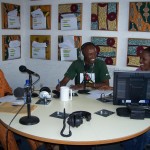Trading for Peace Festival
By Ashley Murphy
The town of Kayanza, Burundi is carved along a beautiful hilly terrain. It is quiet and unassuming, inhabited by only 26,000 people. Yet it lies near the perimeter of Burundi, and therefore is a fragile place. The borders in the Great Lakes region are often plagued with tension and conflicts between petty traders and border officials due to illegal border trading, lack of trust between the two groups, and stigmatization of female traders.
To address these issues, on March 22 this small rural town was transformed into the temporary headquarters for SFCG, which organized a one-day festival celebrating the opportunities and relationships fostered by regional trade. The festival is part of a larger project called “Supporting Trading for Peace,” which aims at strengthening trust between small-scale traders and border officials from Burundi and Rwanda, as well as improving knowledge and understanding of trade-related issues that cause conflict. Different activities are held to build bridges between these two groups by giving them a space to interact positively with one another.
The day of the festival, the Burundi team boldly transformed a barren dirt pitch within hours, creating a circular arena ready for action. As they toiled, the Great Lakes’ notorious rainy season threatened to destroy the day; dark, ominous rain clouds loomed overhead the morning of the festival, taunting us. Fortunately, these clouds dissipated, an act which proved to be a positive forecast for what was to come: pure success.
Though the festival started out slowly, by early afternoon the circle was outlined by more than 3,000 men and women, not counting the hoards of curious children who ventured up to watch. Those who were not border officials and petty traders, shuttled in by SFCG, had been enticed by a circulating truck’s morning announcement of the festival throughout town.
A range of activities defined the day. There were performances by several drum and dance troupes, incorporating messages about taxes, cross-border relations, and the East African Community (EAC) into their songs. Two panel discussions were also conducted to provide a platform for officials and traders to pose questions, discuss challenges, and dispel rumors. The Burundian Tax Office’s Commissioner for Customs and the Spokesman were present on the panel, and their responses to comments, questions, and feedback from petty traders were broadcast live on SFCG’s partner station, Radio Isanganiro, nationwide.
During the panel discussion, people were able to express a variety of concerns, as well as seek clarification on confusing laws and regulations. During both panel discussions, there was a significant amount of laughing, cheering, and jeering on the part of the audience, and it was clear people felt connected to what was being discussed. The atmosphere remained focused, indicating a widespread public interest in bringing traders and officials together for candid discussion.
Direct interactions like this help to break down misunderstandings and confusion, particularly given a clear understanding of trade-related concepts is an ongoing process. The circular space ensured open communication and equality among the audience members, adding to the success of these exchanges.
The event concluded with a performance by Yoya, a popular, socially conscious Burundian musician. With his Kirundi lyrics blasting from the speakers and permeating through the audience, he encouraged people to gather around the stage and fill in the circle. However cliché, this action felt symbolic of people coming together out of enjoyment to fill a void. Music and dance were the clear commonalities uniting all audience members that day.
Overall, the festival harmoniously brought together two groups that often find themselves in conflict over misunderstandings and misapplication of rules and regulations related to cross-border trade. The festival’s success can be seen predominantly in the reactions of the officials present on the panel; the Commissioner independently chose to remain overnight in Kayanza to continue discussions with petty traders, while the spokesman stated that he would like to form a partnership with SFCG to work on these issues in the future.
That there is potential for sustainability beyond the project borders is an accomplishment in itself.
Ashley Murphy is an international intern with SFCG in Kigali, Rwanda. She holds a bachelor’s degree from American University in International Studies.













